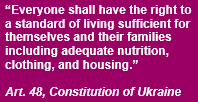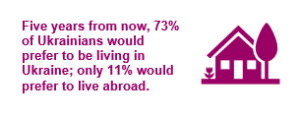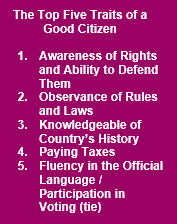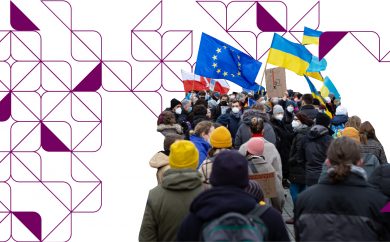The values of people and those of society are not attenuated from a nation’s democratic fabric and foundations. And values do not merely provide a glimpse into a country’s underpinnings, they also serve as an indication of a state’s democratic trajectory. When examining the values of Ukrainian citizens today, it is worthwhile to revisit the beginning of Ukraine’s independent state.
On August 24, 1991, through an act of the Verkhovna Rada, Ukraine declared its independence from the Soviet Union, re-establishing its right to self-determination in accordance with the Charter of the United Nations and proclaiming that only the Constitution and laws of Ukraine were valid on the territory of Ukraine. Later that winter, an overwhelming 92% of Ukrainians affirmed their support for independence via popular referendum with more than 80% of voters participating.
Ukraine’s Declaration of Independence laid the foundation for the country’s popular sovereignty. And with independence came a Ukrainian citizenry. Nearly five years would pass before a constitution began to carve out the scope of Ukrainians’ individual liberties and government powers, providing some affirmation of the democratic ideals and values that came with independence.
Twenty-nine years later, Ukraine’s Independence Day provides an opportunity to reflect on the state of democratic values, citizens’ identity, and to draw lessons from challenges of building a modern nation that can lead citizen’s participation and civil society.
Understanding Ukrainians’ values and conceptions of freedoms informs the process of building a democratic nation, a fair and just economic system in which all Ukrainians can participate in the prosperity of the nation. The USAID/ENGAGE National Civic Engagement Poll, conducted in January 2020, provides key insights into Ukrainians values.
What Makes an Ideal Ukrainian Citizen? Respect for the Law!
In the latest USAID/ENGAGE poll, respondents were asked to describe those traits that define a good citizen. Among the traits deemed most important, Ukrainians valued the awareness of one’s individual rights and the ability to defend them, considered by 90% of respondents to be the most important. Following awareness of rights was the observance of rules and laws (90%). Paying taxes was also considered to be an important trait of a good citizen (86%), along with ability to speak the official language and voting, both receiving approval by 81% of respondents. Deemed least important among respondents were participation in the activities of civil society organizations (62%) and military service (65%).
Corruption Threatens Democratic Values and Citizens
Corruption continues to be seen as a major problem in Ukraine, ranking only below the crisis in the Donbas as the most important issue for the country while also considered the fourth most important issue for individuals. Indeed, breaking the law or participating in bribery disables the rule of law and jeopardizes other democratic processes and institutions.
Despite Ukrainians belief in the importance of both understanding and observing laws, a large number of respondents justified breaking the law on the grounds that public officials did so. When asked whether ordinary citizens also hold a right to break the law given that public servants do so, the majority of respondents (66%) answered that they totally or strongly disagreed and roughly one-third of society agreed, believing that they need not observe laws given the acts of corrupt officials. In another question focusing specifically on the rule of law, 61% of respondents agreed that imperfect laws in the country require that people break them. When asked whether it was impossible to live in complete accordance with the law, the largest portion of respondents (45%) agreed. This support for breaking the law when it does not suit an individual’s own interests underscores the corrosive impact of corruption and its ability to undermine democratic principles.
Moderate Views on Government Intervention Versus Self Determination
While the Constitution of Ukraine lays out a broad conception of social guarantees to its citizens, Ukrainians have fairly moderate opinions on the role the state has in providing citizens with various guarantees and social protections relating to well-being and livelihood.
When it comes to income equality, only about one-quarter of respondents favored equal incomes, while 45% tended to agree that income should be determined by an individual’s effort and the remainder were neutral.

Opportunity and Outlook: Hope for Future Generations, Pessimism About Their Influence on
On a somewhat gloomy note, a majority of respondents (52%) tended to agree that success was determined more by luck and connections than hard work. However, Ukrainians appear to believe that things are not all that bad in today’s Ukraine.
The vast majority of respondents of the USAID/ENGAGE Civic Engagement Poll (73%) in
Notwithstanding, Ukrainians have some serious concerns about inequality, their ability control their future, and equal opportunities. For example, eighty-four percent of respondents agree that the rich are becoming richer in Ukraine while the poor are becoming poorer. The powerful are perceived to be trying to profit at the expense of the average Ukrainian, according to 82% of respondents, while 81% percent believe that their opinion does not matter those in power. These concerns, reflecting a need for greater citizen empowerment, certainly demand attention.
Despite two democratic revolutions within the last 15 years wherein citizens were the driving force and despite the presence of an energetic and value-based well-organized civil society which makes the citizens’ voices heard, 78% of Ukrainians believe that they do not have the ability to influence events in their country. This dualism—between the perception of the role of citizen in decision-making and the reality of citizens dramatically changing their state—suggests that for many Ukrainians the process of becoming citizen still in progress.
The results of the USAID/ENGAGE Civic Engagement Poll show that on the 29th anniversary of Ukraine’s independence, key values such as liberty, equality, and justice remain important to citizens, and therefore, should continue to earn the attention of CSOs and policymakers. While Ukrainians generally favored self-determination in earned income, they also recognized the need for social safety nets. Despite some pessimism about obtaining success and their ability to influence society, an overwhelming majority are prepared to stay in their country. And importantly, Ukrainians value the importance of law and justice, even though they simultaneously perceive that the laws can be rigged against them and that those in power do not abide by them.



